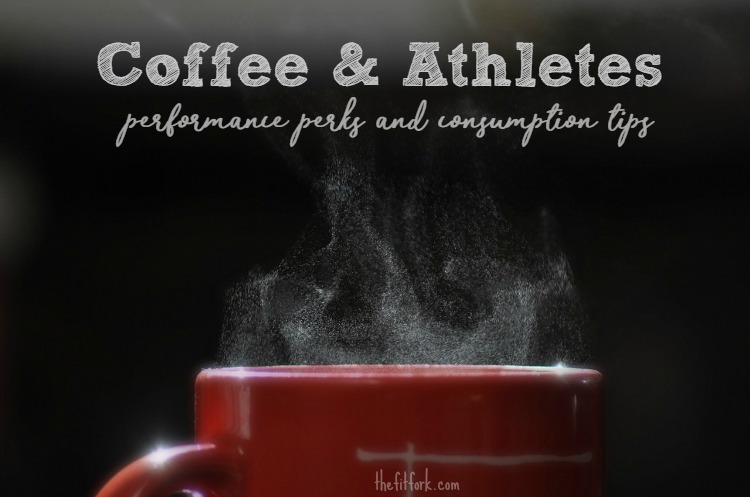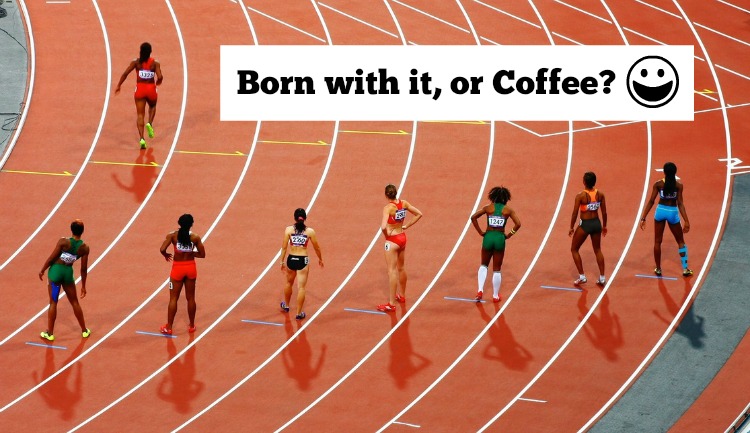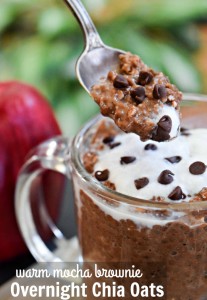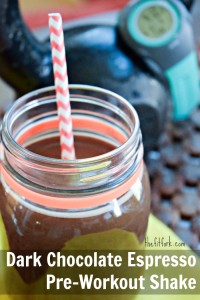Coffee is a social unifier, people are constantly meeting up for a cup, professing their addiction love on everything from t-shirts to internet memes, and it’s a go-to gift for the person who has everything (because you can never have enough coffee, am I right?). While coffee brings us together, it can also set you apart in your athletic endeavors if optimized properly within a training diet. 
Today, I’m spilling the beans on how coffee can improve performance and endurance, increase focus, and provide that extra edge your looking for on race day.
The Cortisol-Coffee Conundrum: Before I give you the buzz on the performance benefits of coffee, you’ll be surprised to find out that while a cuppa Joe “is good for you,” drinking a cup first thing in the morning may not be the best idea. Gasp, what?! A research study reported that jumping right into coffee after the alarm clock goes off can actually mess with the energy-boosting benefits of caffeine by increasing your tolerance. That’s because your body’s levels of cortisol (a hormone that rises and falls several times a day in response to waking up, exercise, stress, etc.) are naturally high in the morning, so adding caffeine will on top it will lessen its stimulation and signal your systems to build a faster tolerance to it. What a buzz kill!
The average person’s cortisol peaks at 8am to 9am in the morning, noon and 1pm and 5:30 to 6:30pm. The suggestion is to time your coffee consumption in between these peak times for maximum effectiveness – for example, take a coffee break at 10am and 2pm when cortisol is tanking and you’re feeling the droop. Of course, this could vary by the natural rhythm of your circadian clock, for example I wake up at 5am every day and my peak is earlier. If you are interested in finding out the timing of Cortisol in your body, Everywell provides an insightful home test (that’s mailed to a lab for analysis) that I’ve used in the past – click here to learn more and save 10% on any home testing kit.
Behold the Performance Benefits of Coffee: Coffee is probably the most common and socially acceptable ergogenic (energy-assisting) aids around. And, it’s legal. Even athletes at the Olympics may now down coffee freely, as the 1000mg limit of caffeine (about 8 cups) was lifted in 2004 (please check with your sport’s governing committee to make sure there a no thresholds). The caffeine can give you that mental of physical edge you need on race day. There has been considerable research on the correlation between coffee consumption and athletic performance and it has been linked to greater focus and alertness, higher energy levels, increased endurance, and quicker recovery. One report says that in endurance sports, caffeine “mobilized fat stores and encourages working muscles to use fat as fuel.” This spares glycogen for later in the race, delaying the effects of depletion and a potentially “bonking” or “hitting the wall.”
But What About Dehydration? If you drink coffee or any other caffeinated drink, I’m sure that you’ve heard that it’s a diuretic and can cause dehydration. But, if used in moderation, it counts towards your daily liquid needs. The military found that solders who drank one cup of coffee per day had no difference in urine output from the soldiers who did not, with all other fluid consumption being the same. However, if you are drinking more that 100mg caffeine a day (equivalent to a small cup), it’s a good idea to drink a little extra water. Also, you will want to “trial run” caffeine before a race many times to make sure your body’s okay with it and that you don’t get any cramping. Check out my 50 Shades of Pee post for a little more info on hydration.
Competition Timing and Quantity: For endurance events, drink a couple cups of coffee (or take about 200mg caffeine in another form) about 3 to 4 hours before the gun goes off. The buzz of caffeine in the blood actually happens sooner, but it takes this long for caffeine to best be able to mobilize fat stores for energy, thus sparing glycogen for later I in the race. Plus, drinking coffee early give you enough time to take care of Mother Nature’s call. Interestingly though, another study suggested six milligrams of caffeine per kilogram of body weight one hour before racing for the best results. The performance boost here probably plays off the initial energy buzz, rather than the how glycogen is being used. So, what do I do? Both . . . a cup or two of coffee in the pre-dawn hours and then another in the hour leading up to the race (however, usually in a gel or tablet, because I don’t want to have to pee again right while waiting in the corral).
Not into drinking coffee? Here are a a couple of my favorite coffee inpsired healthy recipes:
Dark Chocolate Espresso Pre-Workout Shake
How much of a coffee person are you on a scale of 1 to 10? Do you use coffee or another product with caffeine as a performance aid? Have you ever had too much caffeine? Please share in the comments below – XOXO, Jennifer




Great post and info. I use coffee as my pre-workout just about everyday, it really helps. I can’t really tolerate the other strong ones so coffee is perfect.
Agree! the pre-workout powders and canned energy drinks make me nervous . . . and sometimes make my stomach hurt
Great read! As if I needed to solidify my love for coffee any more ;-). You definitely managed to do it.
Thanks!
Basically, coffee is evaharythaaaaaang
I love this. Any excuse to drink more coffee… and fueling for awesomeness is a GREAT excuse. 🙂
I feel there are so many benefits of coffee that it could never be considered a vice 🙂 yay!